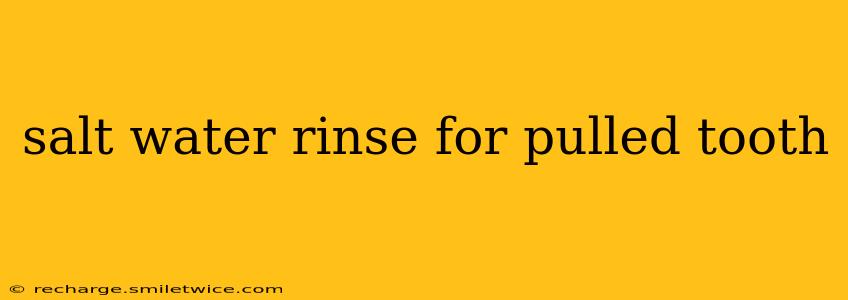Losing a tooth, whether it's a baby tooth or an adult one, can be a bit unsettling. Following your dentist's instructions is crucial for proper healing, and often, that includes rinsing your mouth with salt water. This age-old remedy offers several benefits in the post-extraction healing process. This guide will delve into the why and how of using a saltwater rinse after a tooth extraction.
Why Use a Salt Water Rinse After Tooth Extraction?
A saltwater rinse, also known as a saline rinse, is a simple yet effective way to promote healing after a tooth extraction. The salt's properties help to:
- Cleanse the extraction site: Salt water helps remove food particles and debris from the socket, preventing infection. The gentle cleansing action helps keep the area clean and reduces the risk of complications.
- Reduce swelling and inflammation: The salt water's osmotic properties help draw out excess fluid from the area, thus minimizing swelling and inflammation. This leads to faster healing and reduced discomfort.
- Control bleeding: Saltwater can help to stop minor bleeding by gently coagulating the blood. This is particularly helpful in the immediate hours after the extraction.
- Kill bacteria: Salt has natural antimicrobial properties that help to kill bacteria in the mouth, further reducing the risk of infection. This is a critical factor in preventing dry socket, a painful complication.
How to Make a Salt Water Rinse for Tooth Extraction?
Creating a saltwater rinse is simple. You'll only need two ingredients:
- Salt: Use non-iodized salt. Iodized salt can sometimes irritate the sensitive extraction site.
- Water: Use warm, not hot, water. Hot water can damage the healing tissue.
Instructions:
- Dissolve 1/4 to 1/2 teaspoon of salt in 8 ounces (about 1 cup) of warm water. You can adjust the salt concentration slightly depending on your preference, but don't make it too strong, as this can irritate the area.
- Gently swish the solution around your mouth, focusing on the extraction site but avoiding forceful rinsing. This should be a gentle cleansing action, not a vigorous scrubbing.
- Spit out the solution. Do not swallow it.
- Repeat this process several times a day, especially after meals. Your dentist will provide specific recommendations on how often to rinse.
How Often Should I Rinse My Mouth After Tooth Extraction?
The frequency of rinsing depends on your individual circumstances and your dentist's recommendations. Typically, you might rinse several times a day, especially after meals, to keep the area clean. However, over-rinsing can dislodge the blood clot, increasing the risk of a dry socket. Always follow your dentist's advice on this matter.
What is a Dry Socket, and How Can I Avoid It?
Dry socket (alveolar osteitis) is a painful complication that can occur after tooth extraction. It happens when the blood clot that forms in the extraction socket becomes dislodged or dissolves prematurely, exposing the underlying bone. This is extremely painful and requires further dental treatment. Rinsing gently and avoiding smoking, drinking through a straw, and vigorous rinsing can help prevent a dry socket.
Can I Use Salt Water Rinse for Wisdom Teeth Removal?
Yes, a saltwater rinse is generally recommended after wisdom teeth removal. The principles and technique remain the same as for any other tooth extraction; however, because wisdom teeth extractions can be more involved, always follow your dentist's post-operative instructions carefully.
When Should I Call My Dentist After a Tooth Extraction?
Contact your dentist immediately if you experience:
- Excessive bleeding that doesn't stop after applying consistent pressure.
- Severe pain that isn't managed by over-the-counter pain medication.
- Signs of infection, such as increased swelling, redness, fever, or pus.
- Dry socket symptoms, which include intense pain, bad breath, and a visible empty socket.
Remember, this information is for general guidance only. Always consult your dentist or oral surgeon for personalized post-extraction care instructions. They can provide tailored advice based on your specific situation and the type of extraction performed. Following their recommendations will ensure the best possible healing outcome.
